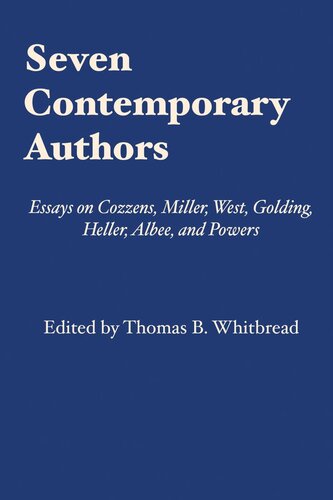

Most ebook files are in PDF format, so you can easily read them using various software such as Foxit Reader or directly on the Google Chrome browser.
Some ebook files are released by publishers in other formats such as .awz, .mobi, .epub, .fb2, etc. You may need to install specific software to read these formats on mobile/PC, such as Calibre.
Please read the tutorial at this link: https://ebookbell.com/faq
We offer FREE conversion to the popular formats you request; however, this may take some time. Therefore, right after payment, please email us, and we will try to provide the service as quickly as possible.
For some exceptional file formats or broken links (if any), please refrain from opening any disputes. Instead, email us first, and we will try to assist within a maximum of 6 hours.
EbookBell Team

4.7
46 reviewsThese seven critical essays, each on a twentieth-century novelist, are disparate in content, but all are concerned with the problem of evil and inhumanity and with the paradoxes of human existence. Each essay discusses a different author, but this independence of subject is resolved into a central theme through the interpretive approach followed by the seven critics. Each of the contributors presents his subject against the background of the current disillusionment and frustration of our age. Underlying each essay are undertones of the "absurdity" of life today for those who consider it thoughtfully, and the contrast between what men would like reality to be and what they actually find. This unity of theme—the problem of evil, of inhumanity, of meaninglessness, the concern for the human being and his future—is developed in an interesting manner. It was exploited in different ways by the seven modern novelists discussed in the essays, and it is presented with different analytical techniques by the seven critics. Yet the reader senses the unity of feeling and purpose amid the diversity of fictional content and critical evaluation. Besdies the interpretive Introduction by Thomas B. Whitbread, the book contains the following essays: R. W. Lewis, "The Conflicts of Reality: Cozzens' The Last Adam" Alan Friedman, "The Pitching of Love's Mansion in the Tropics of Henry Miller" Roger D. Abrahams, "Androgynes Bound: Nathanael West's Miss Lonelyhearts" George Clark, "An Illiberal Education: William Golding's Pedagogy" Vance Ramsey, "From Here to Absurdity: Heller's Catch-22" Anthony Channell Hilfer, "George and Martha: Sad, Sad, Sad" Robert G. Twombly, "Hubris, Health, and Holiness: The Despair of J. F. Powers"